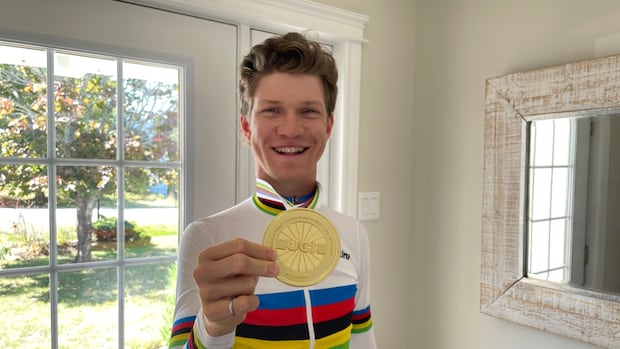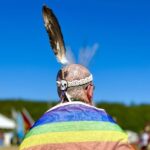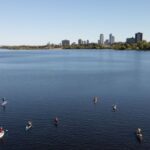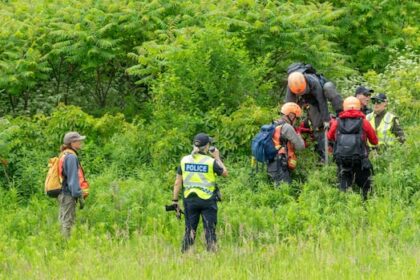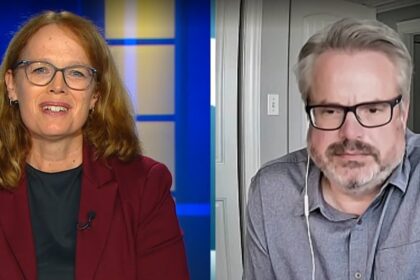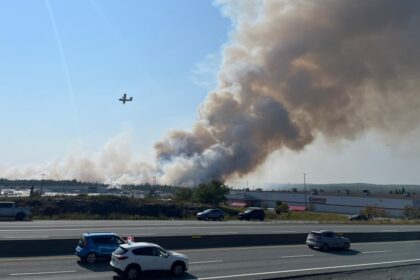Alexandre Hayward knew as he pedalled along the cobblestone streets of Ronse, Belgium, that he was going to have a time trial to be proud of.”I’ve had a really good year,” the New Brunswicker said. “I knew I was in really good shape, and I knew this year, more than any, [there] was definitely a possibility to win.”The 28-year-old from Quispamsis was at the top of his game going into the international competition on Aug. 29, despite dealing with a sore back and a bad night’s sleep the night before.”I was pretty confident I was going to be on the podium — and then, when I came through the finish, I heard it on the loudspeaker.”Hayward had just won the time-trial gold medal at the men’s C3 Para cycling world championships.The feeling?”It’s just extremely cool,” said Hayward, a smile creeping onto his face as he looked back on the race. “It’s hard to put into words, honestly.”WATCH | Alex Hayward may look able-bodied, but he’s a world champion Para cyclist: From unable to walk to crossing the finish line: N.B. cyclist becomes world championAlex Hayward took home the gold in the men’s C3 time trial at the UCI Para-cycling World Championships in Belgium in August.The 23.2-kilometre time trial, a race in which the athletes compete against the clock individually, took Hayward only 30 minutes and six seconds.But he’d spent three years preparing for the race, after first taking up Para cycling during the COVID-19 lockdown.”I kind of went to the bike, like a lot of people did during the pandemic, and things snowballed quite quickly from there,” he said. The moment Alexandre Hayward crossed the finish line in Ronse, Belgium, at the world championship time trials on Aug. 29. (Radio Canada)But Hayward’s route to the world title had its origins in something that happened much earlier.In 2012, when he was in Grade 9, he was an up-and-coming Quismpamsis hockey player taking part in a tournament in Quebec City and thinking a lot about the Quebec Major Junior Hockey League.”You know, we were starting to talk about QMJHL drafts and things like that,” Hayward said. “That was kind of the dream for me, was to play in the QMJHL somewhere.”But during that tournament, Hayward made contact with another player and fell, his neck bending back so far that his teammate said his head actually touched his back.Hayward was paralyzed from the neck due to a spinal cord injury he incurred during a hockey game in 2012, and was told he might be in a wheelchair for the rest of his life. (via Alexandre Hayward on Instagram)The resulting spinal cord injury left Hayward struggling to breathe at first. He was told he might be in a wheelchair for the rest of his life.”The scariest thing for me was maybe not ever getting to play sports again,” he said.But each day, he gained back some ability, working with staff at the Stan Cassidy Centre for Rehabilitation in Fredericton.”Luckily enough for me, I was kind of miraculously able to walk out of Stan Cassidy six months after my injury.”Gearing upHayward began playing wheelchair basketball in the first few years after his injury, as he continued to deal with its impact on his mobility, but it was when he discovered Para cycling that something clicked. It’s a pretty neat opportunity to open people’s eyes to the idea that … people that go to the Paralympics aren’t necessarily all people in wheelchairs or people who are visibly missing a limb.— Alexandre Hayward”I didn’t need to use some kind of special modified thing to keep up, which was the first time that had happened since my injury,” he said.”That’s when I started thinking a little bit more seriously about it, mostly just because I was having so much fun and kind of feeling like an able-bodied person again for the first time.”In the lead-up to the 2024 Paralympic Games in Paris, where he won a bronze medal, Hayward moved to Bromont, Que., to train full time with Cycling Canada’s Paralympic team under lead coach Sébastien Travers.Hayward says with Para cycling, he doesn’t need special adaptations to keep up with others. (Victoria Walton/CBC)”Alex is a quick learner, and he’s an engineer, so he has a really good thought process and analysis process,” Travers said.He said Hayward started out as a rookie, but it didn’t take long for his trajectory to change.”Alex knows that it’s not just about the engine; it’s about how you drive the bike, how about you manage your effort,” Travers said. “So he is becoming more of a complete athlete who can execute a plan, not just pedal hard and hope for the best.”Breaking through barriersThirteen years after his injury, Hayward appears on the surface to be an able-bodied athlete.”Any time I tell somebody I’ve gone to the Paralympics, they ask me why, and why they let me compete with the others,” he said.”So I think it’s a pretty neat opportunity to open people’s eyes to the idea that not everybody who has a disability, it’s super visible, and that people that go to the Paralympics aren’t necessarily all people in wheelchairs or people who are visibly missing a limb.”Hayward managed to complete the 23.2-kilometre time trial course in 30 minutes and six seconds, which was eight seconds faster than the next athlete. (Victoria Walton/CBC)Hayward still faces challenges because of his injury: a lack of normal sensation from his collarbone down, and spasticity of tone — meaning he can have difficulty moving his muscles quickly.”That’s just a small price to pay, all things considered,” he said.After the Paralympics in 2024, Hayward achieved something else he’s always wanted to do. And it’s not an athletic achievement.”It just started making more and more sense to me to come back to New Brunswick,” he said. “I’d always had this dream, probably since Grade 10 or 11, that I realized I wanted to start saving money for a house.”He has just bought that house, and is working for a local construction company as a mechanical engineer.He said he’s always felt proud to be from New Brunswick, and is looking forward to a better work-life-sports balance.”In the last decade, I haven’t lived in the same place for more than 18 months. So I’m looking forward to a little more stability.”Between now and the next race season kicking off in spring 2026, Hayward says he’s going to compete in some local events, and re-root himself in Quispamsis.”The most important thing right now for me is probably trying to figure out what colour I’m gonna paint my kitchen,” he added.
N.B. Para cyclist looks back on gold medal he won 13 years after life-changing injury
